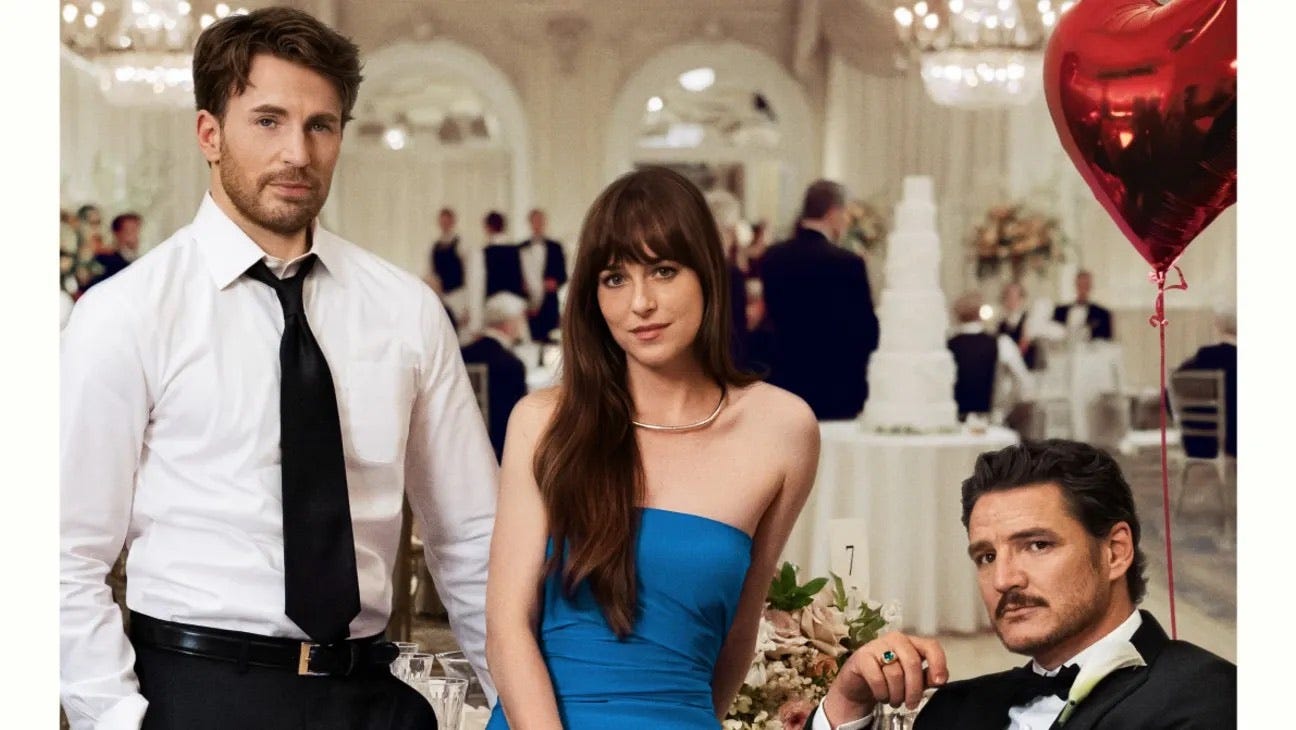In this day and age of “do-it-yourself” romantic pairings available from the likes of Match.com, matchmaking services might seem a little archaic. But wait until you see Lucy’s office and meet her clients. Her firm, Adore, is strictly geared toward the uber-wealthy and powerful. Lucy is the star of her team. As “Materialists” opens, the staff is celebrating her ninth pairing, resulting in marriage.
As per the norm, Lucy (played by Dakota Johnson, in the best performance so far in her young career) attends the wedding. At the reception, she is seated next to the groom’s brother, Harry — at the so-called “singles table.” Harry (Pedro Pascal) turns out to be the ideal client for Lucy. He’s tall, good-looking, rich, and a great conversationalist. But Harry has his eyes set on Lucy herself. Even after explaining that she never dates her own clients, Lucy finds herself in a developing relationship with Harry — a man the Adore staff refers to as a “unicorn.” Why? Because unicorns are too good to be true.
And so, Song’s original screenplay sets up “Materialists” as a modern-day romantic comedy — like one of those old Neil Simon adaptations, but minus the all-too-witty one-liners.
But there’s a catch. (And didn’t you know there’d be one?) The night of the wedding, Lucy meets an old flame named John (Chris Evans). Lucy and John had been an item years earlier, as we learn in the film’s one very well-placed flashback scene. Each was a struggling actor, trying to make it in the tough New York theater scene. Lucy left John because she was simply tired of the financial struggle. Now, years later, Lucy has moved on with her life; while John is still a struggling actor, working a side job with a catering company and sharing a cramped apartment with two essentially worthless roommates.
We learn there is still a spark between Lucy and John. But how on earth could John possibly compete with Harry, the unicorn? This ménage-à-trois establishes one of the year’s very best films so far — and one of the smartest love stories to come along in many years. Now, before you say, “Sounds interesting, Andy, but been there, done that,” this film is not quite like anything you’ve ever seen.
For one, the characters are all smart. They speak smart. And they speak about love, dating, and modern relationships. In fact, that’s all they speak about. Somewhat reminiscent of Mike Nichols’ “Carnal Knowledge”, “Materialists” is about love… and nothing else. We learn very little about Harry’s work (other than that he is in finance), about any of the characters’ families, about anything other than the “here and now” of their relationships.
Second, these characters speak intelligently — almost above their places in life. Characters in Coen brothers’ films possess this trait, but to comic effect. The Coens (or Wes Anderson, for that matter) are wont to feature a garbage man who quotes Nietzsche. But Song’s characters don’t speak intelligently for comic effect; they speak intelligently because she has written them as very astute, observant, and intelligent people. What a refreshing change from the usual dumbed-down screenplays Hollywood churns out weekly. “Materialists” is a true gem.
Furthermore, because the characters are all smart, good, satisfying people, we almost don’t care which man Lucy eventually chooses. While we know she’s attracted to Harry’s wealth, John is presented as a motivated, hard worker — not some deadbeat slacker. And unlike the snooty, rich alternative in many similar stories, Harry is a genuinely nice, caring, lovable guy. This isn’t “Arthur”, where the choice was obvious, and the screenplay was established to dis the rich. *Materialists* isn’t as funny as *Arthur*, but it’s way more nuanced.
And be aware that “romantic comedy” is not an adequate description of “Materialists”. It’s not a comedy. It is a smart, perceptive take on modern romance featuring three of the most insightful, intuitive characters we’ve seen in a long time. The parade of clients coming through Lucy’s office — complete with their over-the-top, choosy “must-have” lists — begins as a source of comic relief and becomes funnier as Lucy becomes increasingly disillusioned with her work.
There’s a side plot regarding a date match gone wrong, which strikes right at the heart of Lucy’s soul — and triggers the chagrin Lucy begins to feel for her career. Coinciding neatly with the emergence of John back into her life, Lucy begins to take stock of the shallowness of her path in life. Is it time for a complete overhaul?
Fortunately, Song doesn’t tie up all the loose ends in a neat little bow. But we are left with a general idea of where Lucy’s life is headed. We are also left with a supremely compelling, sharp, thoughtful look at the world of modern romance, ramped up to power ten in its spot-on observations. “Materialists” immediately takes its place alongside Steven Soderbergh’s “Black Bag” as the best picture so far this year.





